If you have been experiencing these types of behavior from your stepchild: speaking rudely, ignoring you when you are speaking, or not considering your or others’ feelings or rights – you may have been wondering what to do when your stepchild is disrespectful?
When you’re dealing with a situation where your stepchild is disrespectful, it can be emotionally challenging and legally complex.
The answer requires patience and an open dialogue with your spouse (the child’s biological parent) but it is totally manageable. Taking time to gain trust and respect from each other plays a huge part in the success of building a mutual bond and understanding.
This guide provides some legal insights on navigating such situations, along with strategies on how to handle these delicate family matters.
How to Deal with Ungrateful Stepchildren
The first step in dealing with ungrateful stepchildren is understanding that their behavior may stem from a variety of factors, which can include stress, confusion, or fear.
It’s crucial, therefore, to approach this issue with empathy and patience.
Legally, as a stepparent, you may not have the same rights as a biological parent, but you do have responsibilities.
These responsibilities should be guided by what’s in the best interest of the child.
In some cases, seeking professional help such as family therapists or counselors might be beneficial.
They can provide strategies and techniques to improve communication and foster a better relationship.
Remember, every family is unique, and what works for one may not work for another, so it’s important to find a tailored approach that suits your family dynamics.
Practical Steps
Here are some practical steps you can take when dealing with a disrespectful stepchild.
Empathize
Try to see the situation from the child’s perspective. They may be dealing with strong emotions they don’t fully understand or know how to express.
Communicate
Open lines of communication. Ask them about their feelings and listen attentively to their responses.
Set Boundaries
Make it clear what kind of behavior is acceptable and what isn’t. Consistent rules can help children understand expectations.
Seek Professional Help
If the behavior continues to be an issue, consider seeking advice from a professional such as a therapist or counselor.
Patience and Persistence
Change takes time. Show patience and persistence in your approach.
Toxic Stepchildren
One of the most difficult scenarios to navigate is when dealing with toxic stepchildren.
‘Toxic’ in this context means that the behavior of the child is persistently harmful, not just to you, but also to other members of the family, including their siblings.
From a legal standpoint, it’s important to know that you have a duty to ensure the safety and well-being of all children in your care.
If the toxic behavior escalates to physical harm or poses a threat, it may be necessary to involve law enforcement or child protective services.
However, this should be a last resort.
Before it gets to that point, it’s advisable to seek professional intervention.
This might involve family therapy, individual counseling for the child, or even mediation services to help address and resolve conflicts.
Final Thoughts
When your stepchild is disrespectful, it’s important to approach the situation with empathy, patience, and understanding.
Seek professional help if needed, and remember that as a stepparent, you play a crucial role in providing a safe and nurturing environment for your stepchild.
It’s not an easy journey, but with the right support and resources, you can navigate these challenges and foster a positive family relationship.
